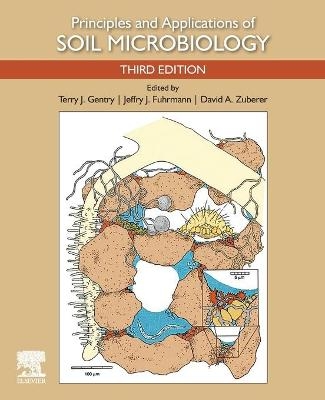
Principles and Applications of Soil Microbiology
Elsevier Science Publishing Co Inc (Verlag)
978-0-12-820202-9 (ISBN)
An excellent textbook and desk reference, Principles and Applications of Soil Microbiology, 3e, provides readers with broad, foundational coverage of the vast array of microorganisms that live in soil and the major biogeochemical processes they control. Soil scientists, environmental scientists, and others, including soil health and conservation specialists, will find this material invaluable for understanding the amazingly diverse world of soil microbiology, managing agricultural and environmental systems, and formulating environmental policy.
Dr. Terry Gentry is a Professor at Texas A&M University and is also the Director of the Soil and Aquatic Microbiology Laboratory (SAML). He is an environmental microbiologist specializing in the development and use of molecular technologies to enhance the detection and remediation of environmental contamination. This includes the detection and identification of microbial pathogens from animal, human, and natural sources and also the characterization of microbial populations and communities contributing to applied remediation processes such as the bioremediation of organic and metal contaminants. He teaches undergraduate and graduate courses in soil and water microbiology. He is the author or co-author of two textbooks; 16 book chapters; and over 100 peer-reviewed journal articles. Jeffry J. Fuhrmann is a Professor of Soil Microbiology in the Department of Plant and Soil Sciences, with a joint appointment in Biological Sciences, at the University of Delaware. He teaches a graduate course in soil microbiology and undergraduate courses in introductory soil science and soils and sustainability. His research has focused primarily on the ecology and diversity of soybean bradyrhizobia using combined phenotypic and genotypic approaches. More recently, this emphasis has extended into analogous studies of associated bacteriophages. His research has additionally examined broader aspects of the microbial ecology of soils and the rhizosphere. He has served as an associate editor for the Soil Science Society of America Journal. Dr. David A. Zuberer is a Professor Emeritus of Soil Microbiology in the Department of Soil and Crop Sciences at Texas A&M University. He taught soil microbiology continuously for >30 years in addition to maintaining an active research program in nitrogen fixation and rhizosphere microbiology. He served as a Technical Editor of the Soil Biology and Biochemistry Division (S3) of the Soil Science Society of America Journal. He is a Fellow of both the American Society of Agronomy and the Soil Science Society of America. He was the recipient of the 2003 Soil Science Education Award and the 2012 Agronomic Resident Education Award of the American Society of Agronomy. He is also a Fellow of the American Association for the Advancement of Science.
1. Introduction and historical perspective
Terry J. Gentry, David A. Zuberer
2. The soil habitat
Julie A. Howe, A. Peyton Smith
3. Microbial metabolism
Jeffry J. Fuhrmann
4. Microbial genetics
Cindy H. Nakatsu
5. Bacteria and archaea
Mary Ann Bruns
6. Fungi
Joseph B. Morton
7. Cyanobacteria and algae
Ferran Garcia-Pichel, Jayne Belnap
8. The soil fauna
Josef H. Görres, Jose A. Amador
9. Viruses
Kurt E. Williamson
10. Microbial ecology
Stephanie A. Yarwood
11. Rhizosphere
Lindsey Slaughter
12. Mycorrhizal symbioses
Rhae A. Drijber, Morgan R. McPherson
13. Carbon transformations and soil organic matter formation
Jeffry J. Fuhrmann, David A. Zuberer
14. Applied aspects of soil carbon
Alan Joseph Franzluebbers
15. Transformations of nitrogen
David D. Myrold
16. Biological dinitrogen (N2) fixation: introduction and nonsymbiotic
David A. Zuberer
17. Biological dinitrogen fixation: symbiotic
Janice E. Thies
18. Microbial transformations of sulfur in soil
V.V.S.R. Gupta, James J. Germida
19. Phosphorus and selected metals and metalloids
Shiping Deng
20. Global gases
Wendy H. Yang, Steven J. Hall, Gavin McNicol
21. Biodegradation of environmental pollutants
William J. Hickey
22. Bioremediation of contaminated soils
Robyn A. Barbato, C. Mike Reynolds
23. Biological control of soilborne plant pathogens and nematodes
James H. Graham, Sarah L. Strauss
24. Composting: the microbiological processing of organic wastes
David A. Zuberer, Larry M. Zibilske
25. Soil microbial influences on “One Health
Ian L. Pepper, John P. Brooks
| Erscheinungsdatum | 15.06.2021 |
|---|---|
| Sprache | englisch |
| Maße | 191 x 235 mm |
| Gewicht | 1470 g |
| Themenwelt | Naturwissenschaften ► Biologie ► Mikrobiologie / Immunologie |
| Naturwissenschaften ► Biologie ► Ökologie / Naturschutz | |
| Naturwissenschaften ► Geowissenschaften ► Geologie | |
| ISBN-10 | 0-12-820202-5 / 0128202025 |
| ISBN-13 | 978-0-12-820202-9 / 9780128202029 |
| Zustand | Neuware |
| Haben Sie eine Frage zum Produkt? |
aus dem Bereich


